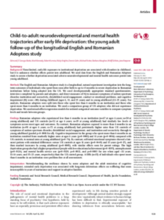Summary
Background
Time-limited, early-life exposures to institutional deprivation are associated with disorders in childhood, but it is unknown whether effects persist into adulthood. We used data from the English and Romanian Adoptees study to assess whether deprivation-associated adverse neurodevelopmental and mental health outcomes persist into young adulthood.
Methods
The English and Romanian Adoptees study is a longitudinal, natural experiment investigation into the long-term outcomes of individuals who spent from soon after birth to up to 43 months in severe deprivation in Romanian institutions before being adopted into the UK. We used developmentally appropriate standard questionnaires, interviews completed by parents and adoptees, and direct measures of IQ to measure symptoms of autism spectrum disorder, inattention and overactivity, disinhibited social engagement, conduct or emotional problems, and cognitive impairment (IQ score <80) during childhood (ages 6, 11, and 15 years) and in young adulthood (22–25 years). For analysis, Romanian adoptees were split into those who spent less than 6 months in an institution and those who spent more than 6 months in an institution. We used a comparison group of UK adoptees who did not experience deprivation. We used mixed-effects regression models for ordered-categorical outcome variables to compare symptom levels and trends between groups.
Findings
Romanian adoptees who experienced less than 6 months in an institution (n=67 at ages 6 years; n=50 at young adulthood) and UK controls (n=52 at age 6 years; n=39 at young adulthood) had similarly low levels of symptoms across most ages and outcomes. By contrast, Romanian adoptees exposed to more than 6 months in an institution (n=98 at ages 6 years; n=72 at young adulthood) had persistently higher rates than UK controls of symptoms of autism spectrum disorder, disinhibited social engagement, and inattention and overactivity through to young adulthood (pooled p<0·0001 for all). Cognitive impairment in the group who spent more than 6 months in an institution remitted from markedly higher rates at ages 6 years (p=0·0001) and 11 years (p=0·0016) compared with UK controls, to normal rates at young adulthood (p=0·76). By contrast, self-rated emotional symptoms showed a late-onset pattern with minimal differences versus UK controls at ages 11 years (p=0·0449) and 15 years (p=0·17), and then marked increases by young adulthood (p=0·0005), with similar effects seen for parent ratings. The high deprivation group also had a higher proportion of people with low educational achievement (p=0·0195), unemployment (p=0·0124), and mental health service use (p=0·0120, p=0·0032, and p=0·0003 for use when aged <11 years, 11–14 years, and 15–23 years, respectively) than the UK control group. A fifth (n=15) of individuals who spent more than 6 months in an institution were problem-free at all assessments.
Interpretation
Notwithstanding the resilience shown by some adoptees and the adult remission of cognitive impairment, extended early deprivation was associated with long-term deleterious effects on wellbeing that seem insusceptible to years of nurturance and support in adoptive families.
Read the accompanying comment piece: Early life deprivation: is the damage already done?

